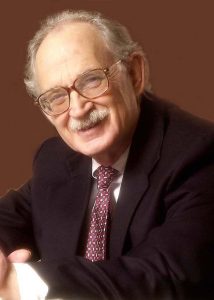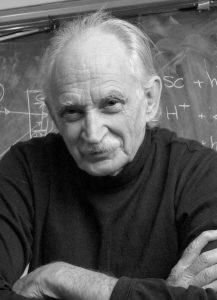50+ year Society member pioneered electrochemistry
Pennington, NJ – The Electrochemical Society (ECS) is sad to announce the passing of our colleague and friend, Allen J. Bard, on February 11, 2024. Throughout his career, Allen was a beloved and respected member of the ECS community as an author, Fellow, awardee, editor, meeting participant and organizer, and more.
“Allen’s contributions to the advancement of electrochemistry and science are extraordinary, and his dedication to the advancement of many generations of younger scientists is legendary. If there is a common theme to his work, it is the pursuit of fundamental scientific knowledge and discovery; Allen was a fearless scientist, encouraging young scientists in his laboratory to constantly create and pursue their own ideas and experiments off the beaten path,” said Shelley D. Minteer and Henry White, co-editors of the Journal of The Electrochemical Society Focus Issue in Honor of Allen J. Bard.
“Professor Bard was a humble genius who insisted that his students were his most important contribution. Certainly, ECS benefited largely from Bard’s commitment to teaching. Three of my fellow ECS presidents were his students: Larry Faulkner, ECS president from 1991-1992; Paul Kohl, ECS president from 2014-2015; and Johna Leddy, ECS president from 2017-2018,” said current ECS President Gerardine Botte.
ECS Executive Director Christopher Jannuzzi added, “Prof. Bard became an ECS member in 1965, setting a great example of service to the Society as a journal associate editor, chair of the Electro-Organic Division (now the Organic and Biological Electrochemistry Division), and member at large of the ECS Texas Section. He enjoyed working with the Society’s governance and was especially proud to help establish organic/biological electrochemistry as an essential topical interest area for the Society, and, as a member of the Committee on the Free Dissemination of Research (2014-2015), he helped establish the Free the Science initiative.”
Life and science
 Allen was born in New York City in 1933. In an ECS Masters Interview at the 227th ECS Meeting (May 2015, Chicago, IL), Allen says he always knew he wanted to be a scientist and describes playing with his older brother’s chemistry set when he was only four or five years old! He attended the prestigious Bronx High School of the Sciences, then obtained his BS in Chemistry at City College of New York in 1955. After a brief stint in industry, he went on to Harvard University. There he was introduced to electrochemistry which he said he “took to like a fish to water.” Under the supervision of renowned electroanalytical chemist James J. Lingane, Allen received an MSc in 1956 and PhD in 1958. Norman Hackerman, University of Texas at Austin (UT-Austin) Chemistry Department Chairperson (and later president of the university), offered Allen a teaching job with a salary of $5,200 a year and $5,000 for equipment. Although the New York native had never been to Texas, which he thought of as the Wild West filled with cowboys, he accepted the job. He taught there for 63 years—from 1958 until his retirement in 2021 as the Hackerman-Welch Regents Chair Professor and Director of the Center for Electrochemistry.
Allen was born in New York City in 1933. In an ECS Masters Interview at the 227th ECS Meeting (May 2015, Chicago, IL), Allen says he always knew he wanted to be a scientist and describes playing with his older brother’s chemistry set when he was only four or five years old! He attended the prestigious Bronx High School of the Sciences, then obtained his BS in Chemistry at City College of New York in 1955. After a brief stint in industry, he went on to Harvard University. There he was introduced to electrochemistry which he said he “took to like a fish to water.” Under the supervision of renowned electroanalytical chemist James J. Lingane, Allen received an MSc in 1956 and PhD in 1958. Norman Hackerman, University of Texas at Austin (UT-Austin) Chemistry Department Chairperson (and later president of the university), offered Allen a teaching job with a salary of $5,200 a year and $5,000 for equipment. Although the New York native had never been to Texas, which he thought of as the Wild West filled with cowboys, he accepted the job. He taught there for 63 years—from 1958 until his retirement in 2021 as the Hackerman-Welch Regents Chair Professor and Director of the Center for Electrochemistry.
Allen mentored over 75 PhD students and 150 post-doctoral fellows. Their combined contributions to the field of electrochemistry are legendary, including electroanalytical techniques for evaluating electrode reaction mechanisms, simultaneous electrochemistry electron spin resonance (SEESR) techniques, nonaqueous solvents for investigating energetic species, electrogenerated chemiluminescence (ECL), polymer modified electrodes, semiconductor photoelectrochemistry, photocatalysis, scanning electrochemical microscopy (SECM), and single-particle collision electrochemistry.
The co-author of more than 1,000 publications (including 125 in the Journal of The Electrochemical Society) covering all areas of modern electrochemistry, Allen produced 88 book chapters and other publications, and holds more than 30 patents. His 1980 book, Electrochemical Methods: Fundamentals and Applications, written with former student (and form ECS president) Larry Faulkner, is still the most widely used electrochemistry textbook. He served as Editor-in-Chief of the Journal of the American Chemical Society from1982 – 2001. When asked in the Masters Interview how he produced his extraordinary volume of inventions and publications, he said, “I was very fortunate to have a lot of very good students.”
Awards and accolades
Allen’s accomplishments did not go unnoticed. The Electrochemical Society—the scholarly association home for his passion for electrochemistry—named him an Honorary Member in 2013 and Fellow of The Electrochemical Society in 1990. He received top ECS awards including the 2007 Europe Section Heinz Gerischer Award, 1987 Olin Palladium Award, 1986 Henry B. Linford Award for Distinguished Teaching, and 1981 Carl Wagner Memorial Award.
ECS founded the Allen J. Bard Award in 2013 to honor the professor’s extensive contributions in the field of electrochemistry. The Bard award recognizes paradigm-shifting contributions in the fields of electrochemical science and exceptionally creative experimental or theoretical studies that have opened new directions in electroanalytical chemistry or electrocatalysis. Nominations for the award are accepted through April 15, 2024.
ECS published a Focus Issue of The Journal of The Electrochemical Society in Honor of Allen J. Bard in 2016. The 24 research articles in this special issue, many from former students and postdocs, covered the many electrochemistry topics impacted by Allen during his career.
In 2013, President Barack Obama presented Allen Bard with a National Medal of Science for Chemistry. (John Goodenough, fellow UT-Austin professor and ECS member, received that year’s award for engineering.) “I am proud to honor these inspiring American innovators,” Obama said. “They represent the ingenuity and imagination that has long made this nation great—and they remind us of the enormous impact a few good ideas can have when these creative qualities are unleashed in an entrepreneurial environment.”
Among the many awards Allen received through his distinguished career are the 2019 King Faisal International Prize in Chemistry; 2014 Enrico Fermi Award, 2008 Wolf Prize in Chemistry, 2002 Priestley Medal, 1984 Charles N. Reilley Award, and 1984 ACS Fisher Award in Analytical Chemistry. He was elected a Fellow of the American Academy of Arts and Sciences in 1990.
After Allen
Allen was asked about potentially significant areas of electrochemistry in the future. “I still think that eventually photoelectrochemistry will be a solution to the energy problem… It will take discoveries. But what I learned in my career is that discoveries do happen. You have to have faith; discoveries happen… and electrochemistry is the best way to get there… ECS meetings are great,” he said.
Allen dismissed the notion that he is the “father of electrochemistry.” Rather, his primary focus was teaching and mentoring future generations of scholars and scientists. “What I am building is my students, and their students after them. And they will help build the edifice of science. That’s the most important thing that I do.”
The Electrochemical Society (ECS)
The nonprofit professional Electrochemical Society has led the world in electrochemistry and solid state science and technology and allied subjects since 1902. We advance scientific theory and practice through publications, meetings, continuing education, and collaboration. Our robust global membership develops solutions to the planet’s major challenges. Scientists, engineers, and industry leaders share research at ECS biannual, co-hosted, and sponsored meetings. The ECS Digital Library on IOPscience hosts abstracts and highly peer-reviewed articles from publications, including the Journal of The Electrochemical Society (the oldest journal in its field), ECS Journal of Solid State Science and Technology, and new open access journals ECS Sensors Plus and ECS Advances.
Media Contact
The Electrochemical Society
Shannon Reed
Director of Community Relations
609.737.1902, Ext. 107
Shannon.Reed@electrochem.org

